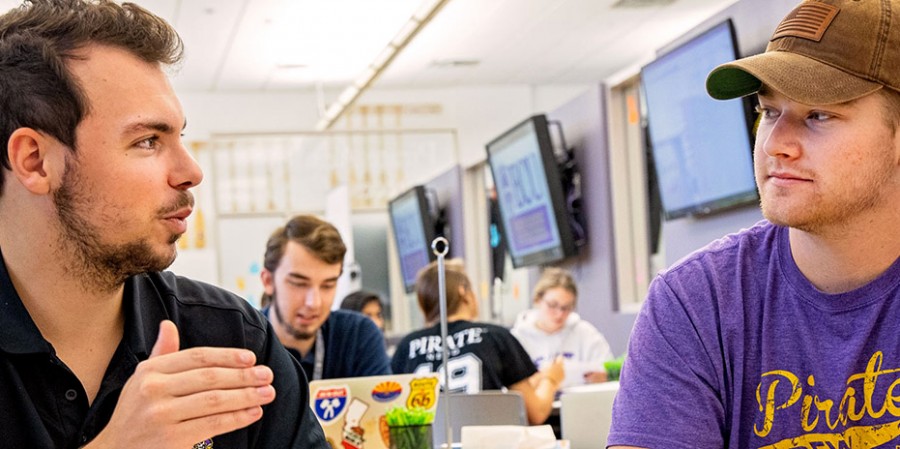Publisher's note: The author of this post, Jules Norwood, is a contributor to ECU News Services.
Matthew Elvington, left, speaks with Will Snipes in the Pirate Academic Success Center. | Photos: Cliff Hollis
It's September, and you're still learning to navigate life on a college campus. Mom isn't there to get you up for class or make you study. Meals are up to you to figure out. And you've just had your first round of exams. Maybe they didn't go so well.
Then your phone rings, and on the other end of the line is another student, one who's been exactly where you are now.
"How are things going?" she asks.
"How are your classes so far, and did exams go OK? Are you interested in meeting with a study group or scheduling a tutoring appointment?"
And maybe that push is just what you needed to tap into the help that's available to all students at East Carolina University, from tutoring and study skills coaching to counseling.
That's the thinking behind a pilot program that started last year in the
Pirate Academic Success Center (PASC). Elizabeth Coghill, director of the PASC, said one of the center's challenges is getting students who are in need of help to take advantage of its services.
"We felt like we needed more touch points with students," she said.
"We have to hit this population with everything. We have a segment we can email, we have a segment we can text and we have a segment that needs a phone call. And you have to hit all those measures in order to get them to turn out; you can't just rely on one."
The Connect for Success call center was created as a pilot program in fall 2018. Incoming freshmen have the opportunity to opt in during orientation, and some at-risk students are added to the call list based on information from the undergraduate admissions office and campus living. There were 800 students on the list the first year, and this year the number is up to 1,700.
The Connect for Success call center enlists student mentors called success navigators to check in with first-year students who may be struggling academically, providing critical information and referrals to campus resources.
Freshmen on the Connect for Success call list receive four calls in the fall and four more in the spring from PASC student mentors called success navigators. Each call has a specific focus and purpose, but the main goal of all the calls is to make sure the student knows there are people on campus who care about how they're doing.
The first call of the semester is an initial check-in and an invitation to campus services, and the second includes information about registration for the next semester, a reminder to meet with an academic advisor, and the class withdrawal date. The third includes a GPA check and information about exams. Finally, late in the semester, the fourth call covers any questions the students have before they leave for the break.
"What I hope for students to do is have a plan when they speak to their parents, and just know that we care whether they're coming back or not," Coghill said.
"If they have a plan in place, their parents are more likely to allow them to come back."
Sophomore Matthew Elvington said that while he knew about the PASC before he started as a freshman, his first conversation with the call center came as a wake-up call.
"The classes are more challenging than high school," he said.
"In high school I had a plan for getting through, and it doesn't work in college. You have to do everything you possibly can to pass a class. You've got to study, you have to read, you have to take notes, you have to put your head down and drive. You have to work for it; you're not getting anything for free."
"The first time I got that call, I stopped everything I was doing and thought, 'Wow, I need to change something here.'"
Elvington started using PASC services more; he's in the center every Wednesday and often on Thursdays as well. He said buckling down, along with the help he receives, has made a noticeable difference in his grades.
"Tutoring is the way to go," he said.
"You might feel kind of vulnerable, but if you need it, you need it. I wish I'd realized that way beforehand. ... It's the connection and everything you get out of one of the tutoring sessions; it just helps so much."
So far, Coghill said, a third of the students on the list have reported that they're already using services, and 23% have made PASC tutoring or study skills appointments.
In the aftermath of Hurricane Florence, an extra call was added to make sure students were aware of the online form for students who couldn't get back to campus when classes resumed.
"We added that call just to check on them and make sure that they understood," Coghill said. In some cases, students were without power and couldn't fill out the form, so the navigators were able to help them with that.
"These were all students who had never navigated this before."
A unique feature of the Connect for Success call center is that each success navigator calls the same list of students throughout the year, so the voice on the line becomes familiar.
"It's another warm voice from ECU saying we care about whether you do this or not and we want you back," Coghill said.


